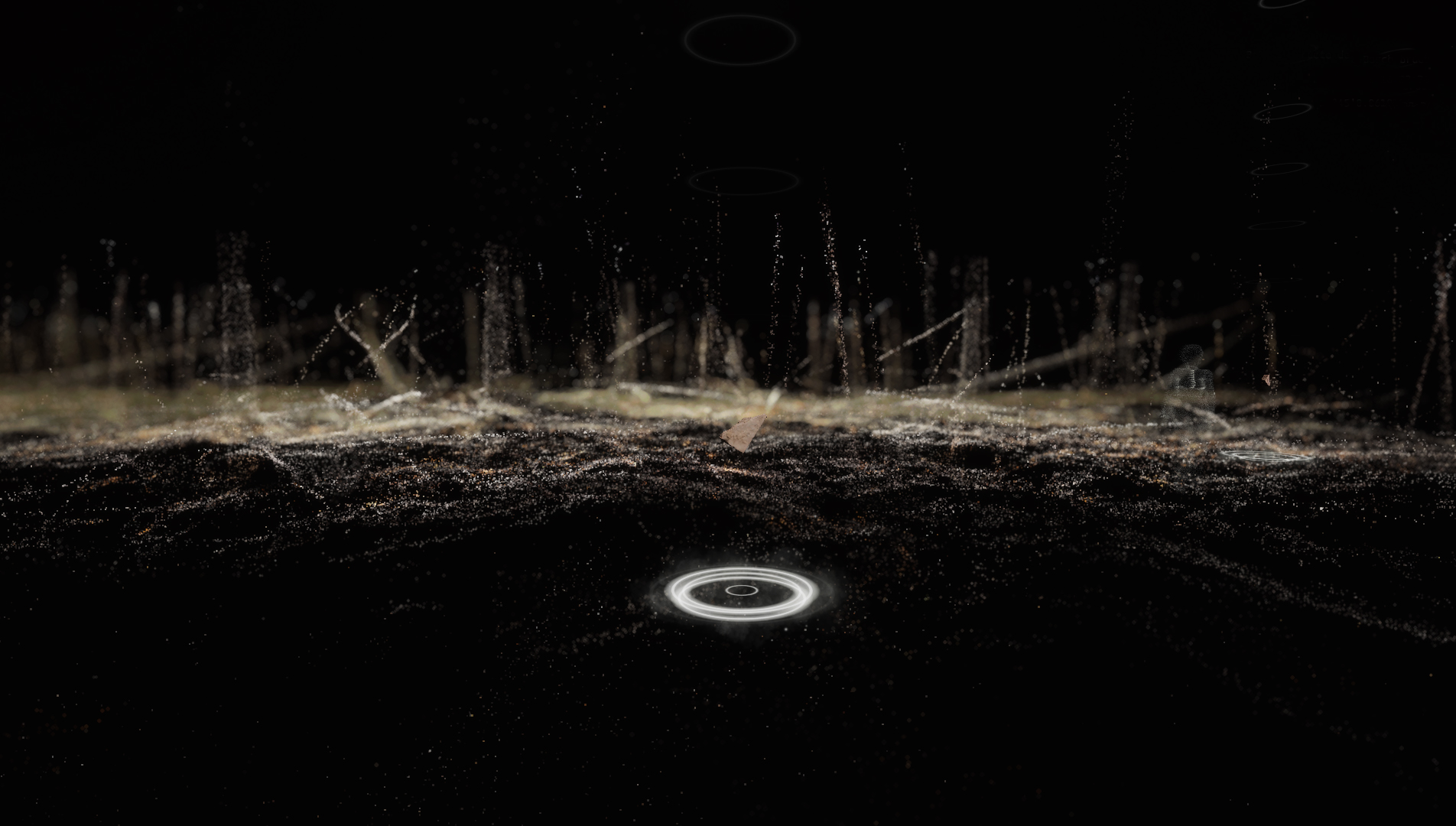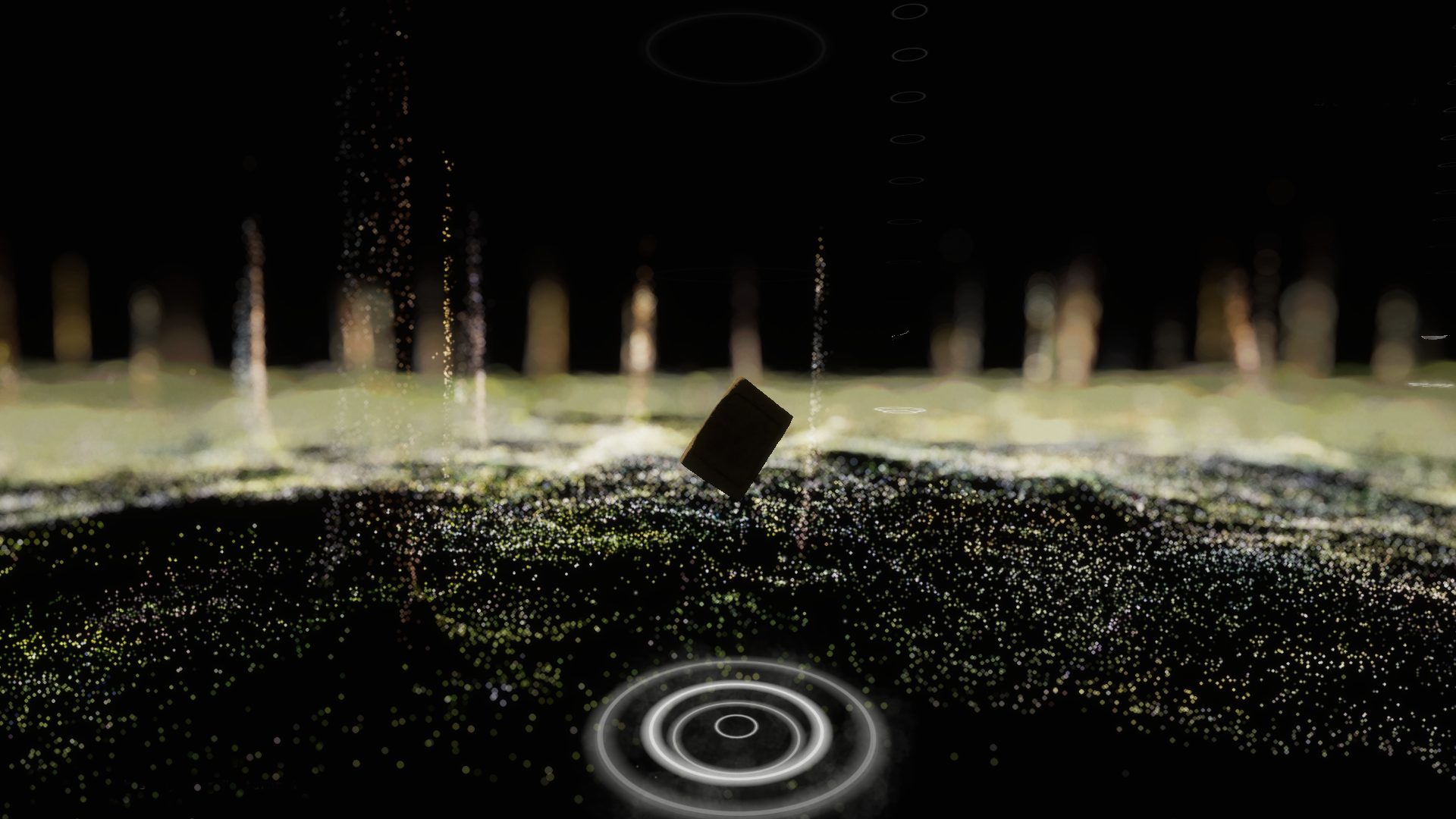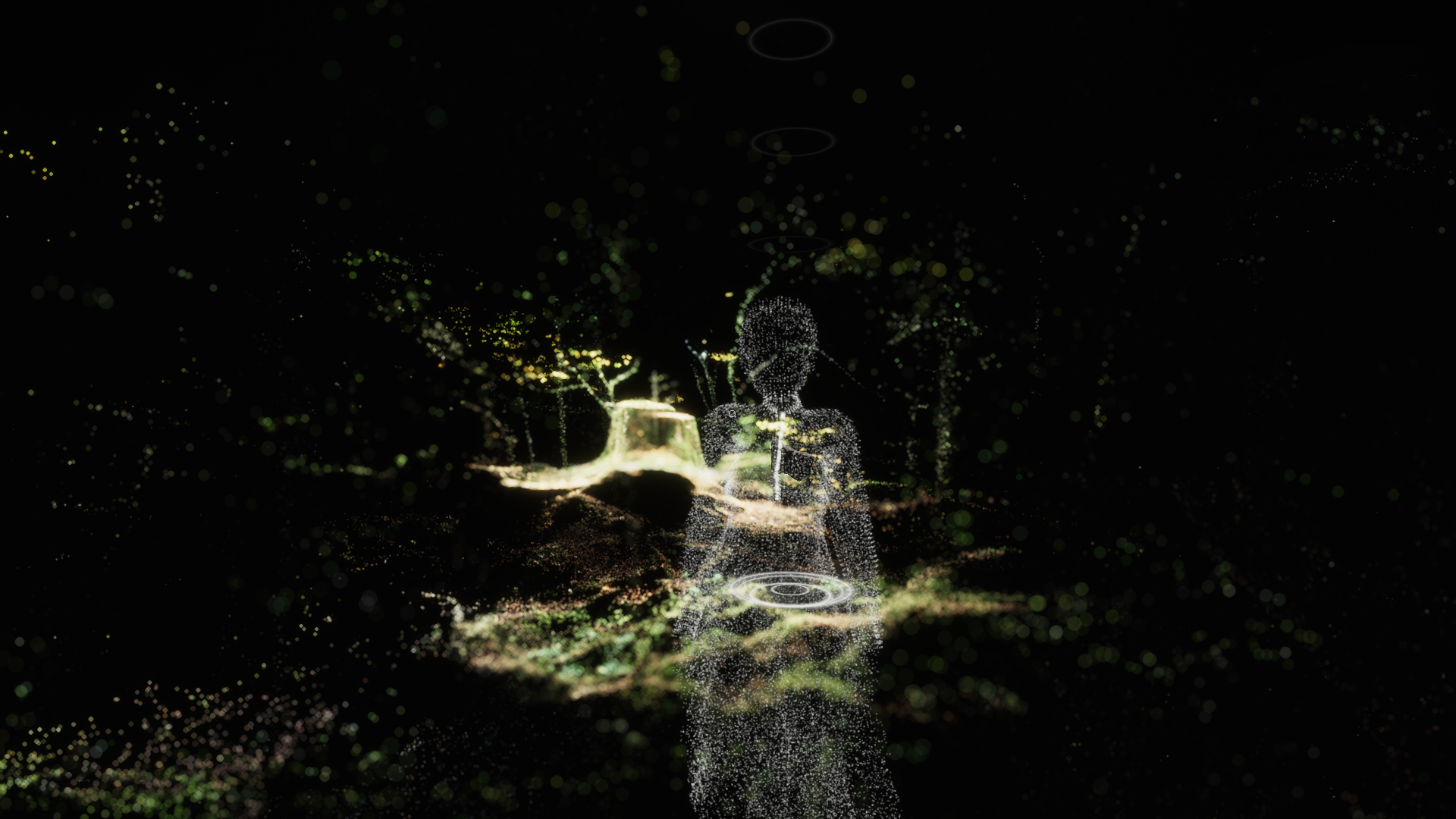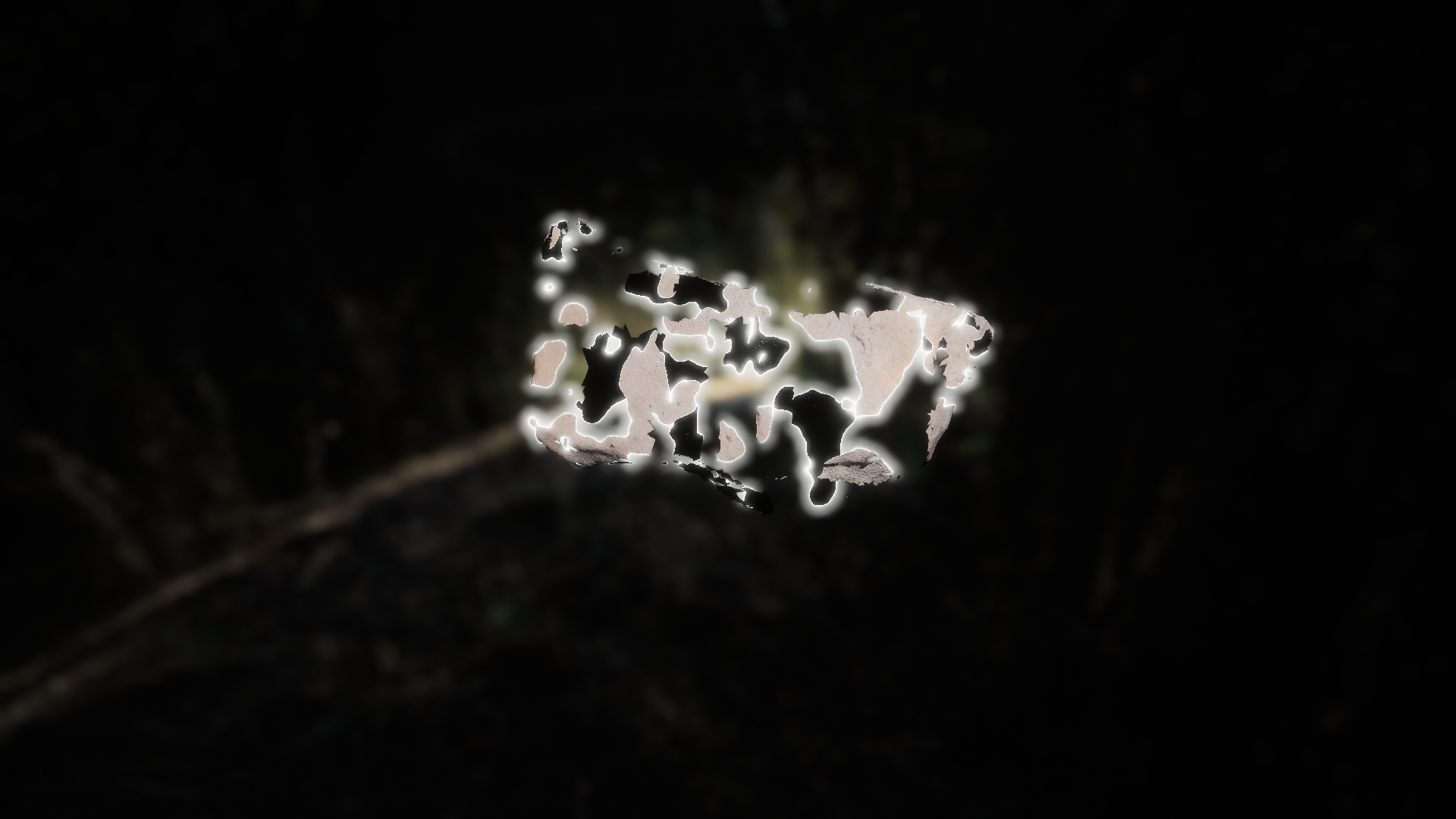about.
"Cocci - Fragments of Passages" is an exploratory journey into memory, presented as an interactive graphical experience accessible via desktop or HMD (Head-Mounted Display). It uses virtual reality as a medium to expand our understanding of "place", transforming it into a space that reveals itself and can only be interpreted through the traces left by humanity in its passage. The landscape presented to the user is a point cloud reconstruction of the woods that inspired this experience: those that border the "Peschiera" at the foot of the Pollino National Park in Basilicata. In this place, time seems to have little effect, and during morning walks, when the grass is still dewy, it is possible to find ancient fragments of pottery and tiles of different shapes and sizes, left there by unknown people, known only to the silent trees that bore witness. The user is invited to explore a desolate yet ethereal world full of memories, with each shard encountered along the way serving as a tangible fragment of those memories. These shards act as visual and auditory stimuli designed to evoke sensations, impressions and emotions in the user. They are strategically placed to encourage and guide the exploration of those who interact with them.
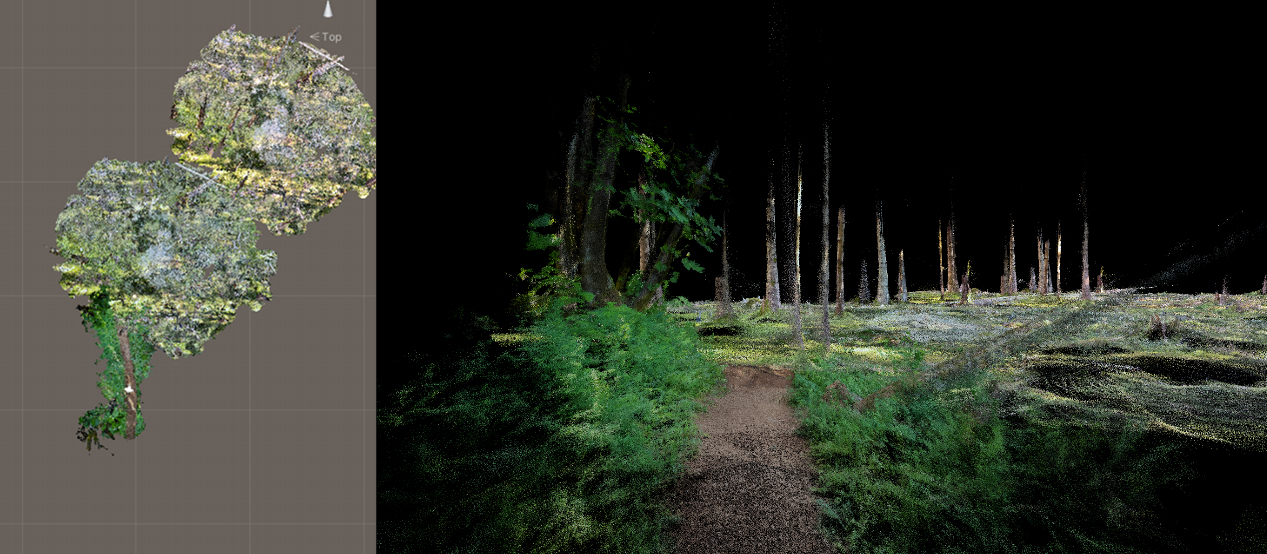
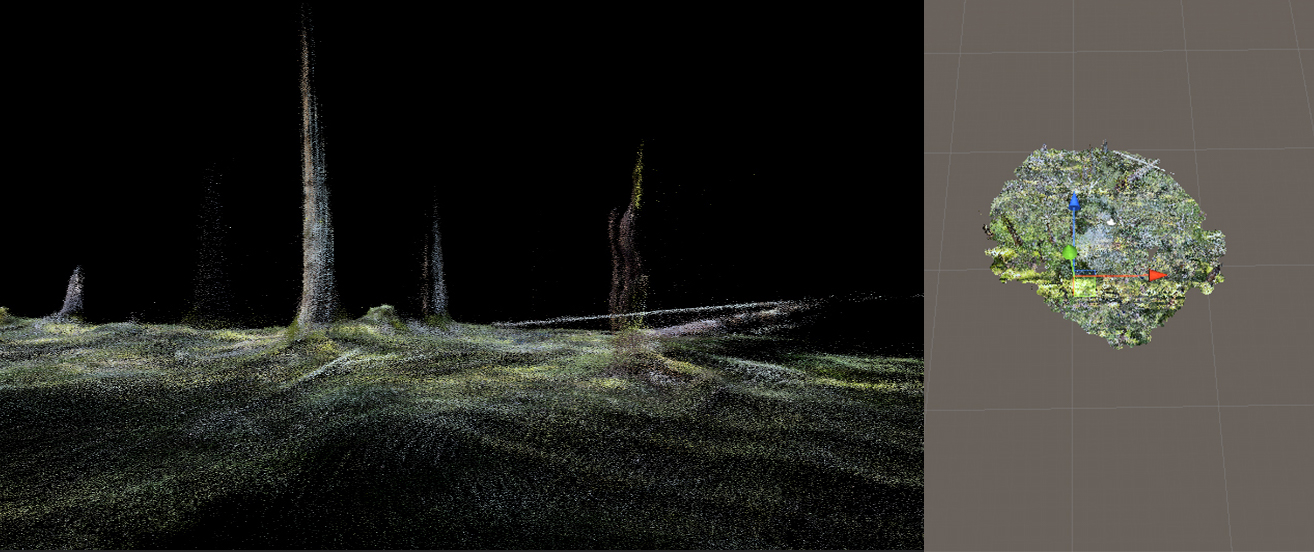
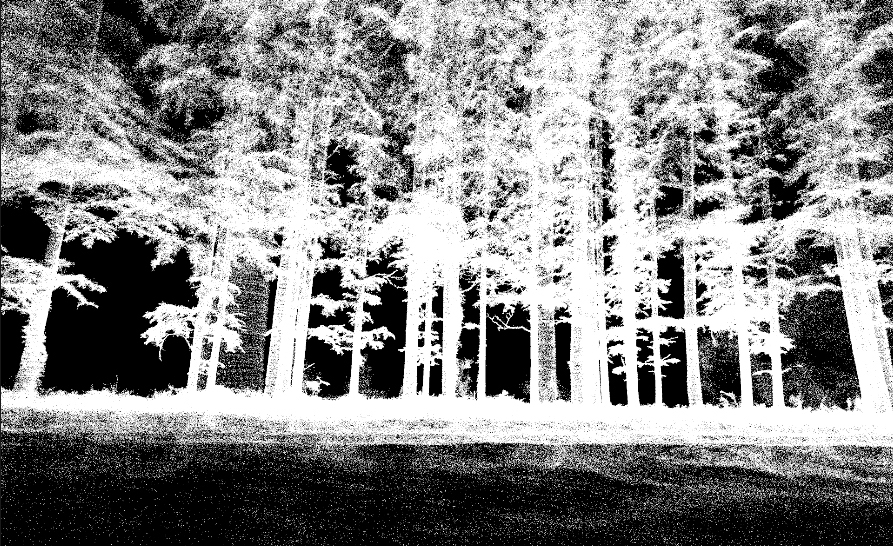
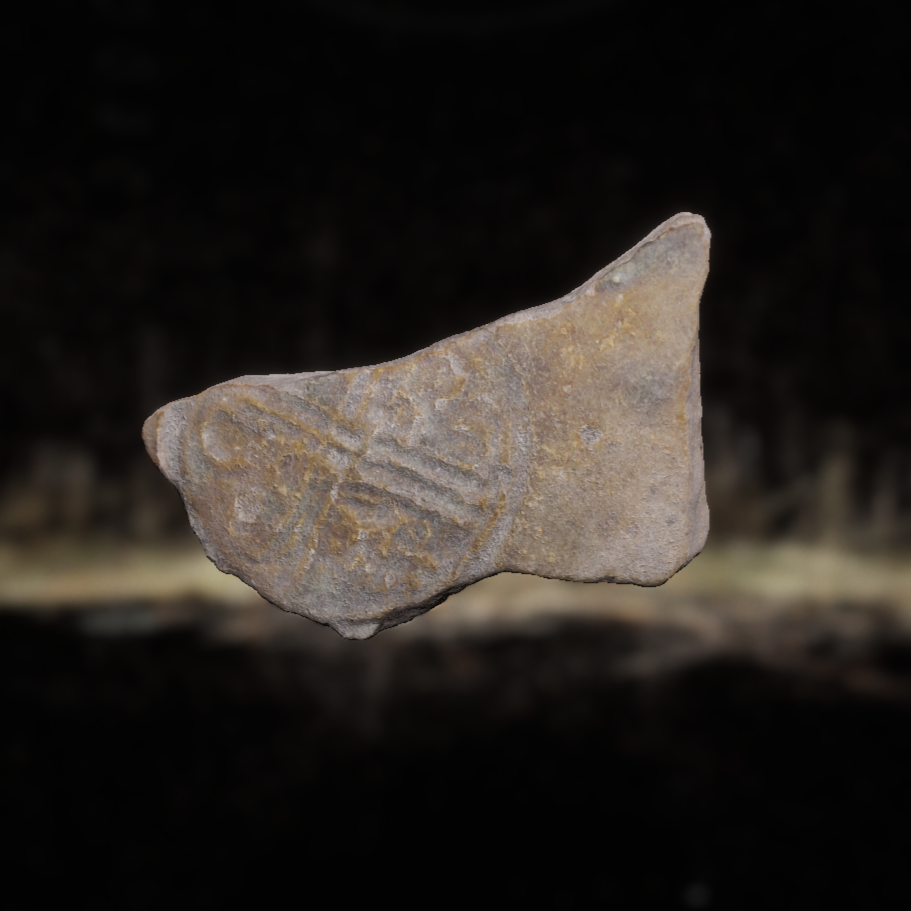
Title:
Il sogno della bara/The dream of the coffin
Description:
Domenico racconta un sogno della scorsa notte/Domenico talks about a dream from last night
Content
Local dialect:
Quann tirav "a' voria" - iera accussì ca chiamamm ù vent i vascij, "voria - ier bell, nun chiuvì maij; certu iè ca faciv fridd, ma ù ciel iera semp sincìr, e i iurnat eran assai bell.
Au cuntrarij "ù punent" ù chiamamm "uaddarus", picchì chiuvì semp e c'era à neglij, nun vidis maij ù sol.
Uvì picchì u chiamamm "uaddarus", picchì ier nu vient cup, purtav nuvl, neglij, chiùvì, quistu facì.
IT:
Quando tirava "a' voria"- era così che chiamavamo il vento da sud, "voria" - era bello, non pioveva mai; certo, faceva freddo, ma il cielo era sempre limpido, e le giornate erano belle.
Al contrario il ponente lo chiamavamo "u' uaddarus", perchè pioveva e c'era la nebbia, non vedevi minimamente il sole.
Ecco perchè lo chiamavamo "uaddarus", perchè era un vento cupo, portava con sè le nubi, la nebbia, pioveva, questo faceva.
EN:
When it pulled 'a' voria' - that's how we called the wind from the south, 'voria' - it was nice, it never rained; sure, it was cold, but the sky was always clear, and the days were beautiful.
On the contrary, we called the west wind 'u' uaddarus', because it rained and there was fog, you couldn't see the sun at all.
That's why we called it 'u' uaddarus', because it was a gloomy wind, it brought with it clouds, fog, it rained, that's what it did.
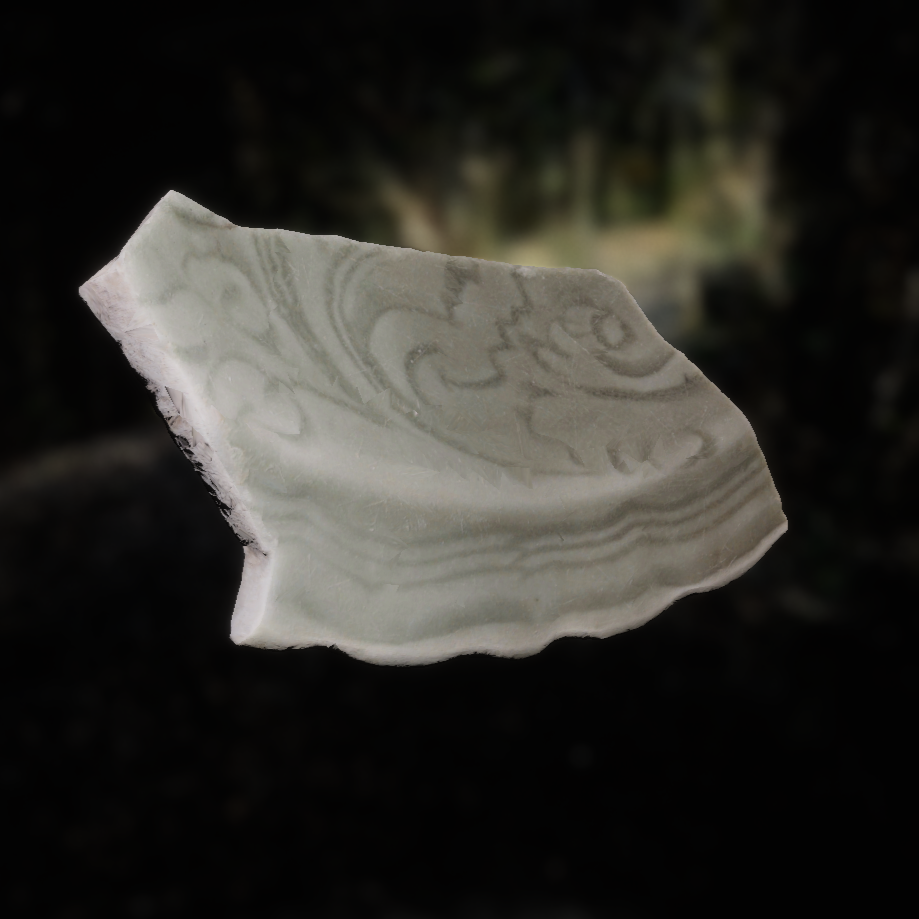
Title:
I venti/The winds
Description:
Maria racconta i venti della sua infanzia/Maria talks about the winds of her childhood
Content
Local dialect:
Ier'm dà fora, nn'anz ù studij da dottoress, quann cu at cristian parlamm - ndù suonn, mica verament, eh!
A na certa mi cad'n l'uocchj a na bann, e dà vig na bar!
A' bar tnì ù color i sti mobl.
E allor aggj chiest: "E sta bar, cu c'ha mis loc?"
IT:
Eravamo lì fuori, dove adesso si trova lo studio della dottoressa,
mentre con altre persone discutevamo - nel sonno, mica per davvero, eh!
Ad un certo punto mi cade lo sguardo in un punto, e lì vedo una bara!
La bara aveva il colore di questi mobili.
E allora ho chiesto: "E questa bara, chi ce l'ha messa qui?"
EN:
We were out there, where the doctor's office is now,
while with other people we were discussing - in our sleep, not for real, eh!
At one point my eyes fell to a spot, and there I saw a coffin!
The coffin had the color of this furniture.
So I asked, "And this coffin, who put it here?"
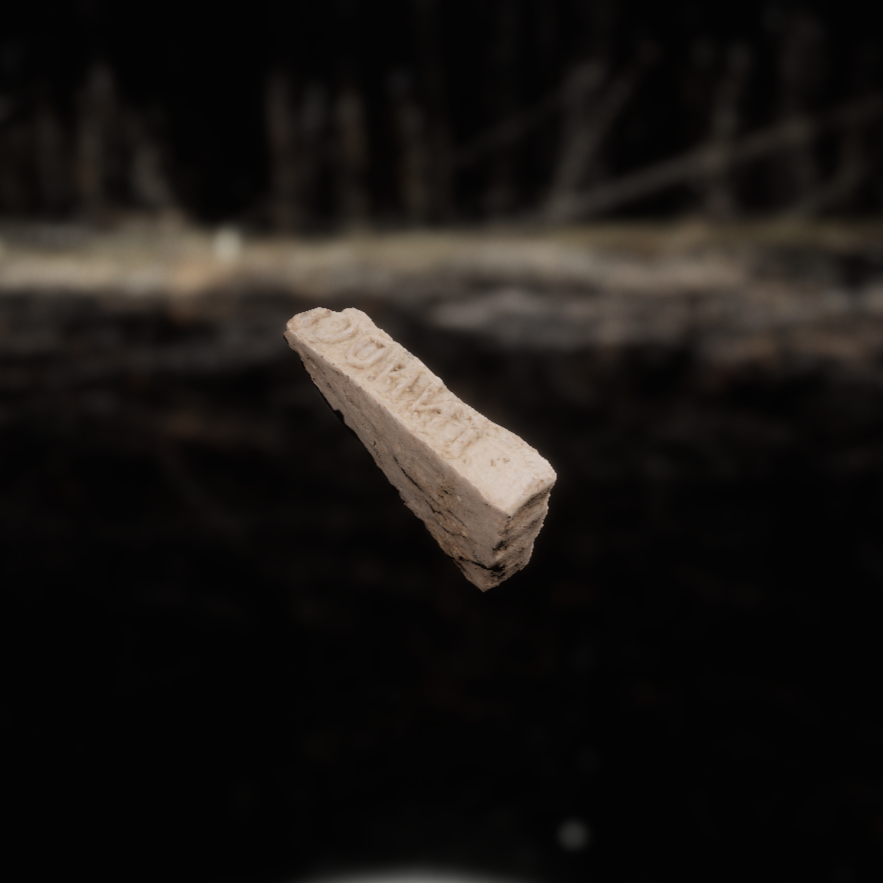
Title:
A' cunsegna du rusarij/Handing over the rosary
Description:
Preghiera antica della campagna da recitare al termine del rosario, per consegnarlo nelle mani della madonna.
E' stata scritta da Maria Petronilla Gioia e l'amica di infanzia Maria Propato, che qui la recita in suo ricordo,
al suo funerale./An ancient country prayer to be recited at the end of the rosary, to deliver it into the hands of the Virgin Mary.
It was written by Maria Petronilla Gioia and her childhood friend Maria Propato, who recites it here in her memory,
at her funeral.
Content
Local dialect:
Cù quistu rusario ch'amu cantat
la madonn s'a prisintat,
n'am avut il suo buon amor,
n'am cantat dì piccatori.
O ben mij, o ben mij,
quann iè bell à madr ì dij.
E stu figliuol ca ten's mbrazz,
ch bedda grazia ca ci fazz,
facilla pristo e nun tardiva,
tu Marij ca la pui fé.
O madonna di lu rusario,
sì magnifica e divin,
custudit stù rusarij
ca cantammo quista sera,
e se mancamient c'era
ti priam ì ni risparimé.
A' madonn s vutai e diss
"mancament nun ci nn'è
di dicit lu mij rusarij
e nun lasseret maij.
all'ora dilla morta vui saret accompagnet"
Rosa sia la regina bedd,
ca lu rusarij ié chien d'amur,
vall a dic a nost cuor,
vallo a dice a nost amor.
Santu Dumenico miu biato,
lu rusario ié dij antic.
O Marij à verginell,
tutta pura e tutta bella.
Nui vulimo dij pì patr,
à madonn pì nosta madr,
tutt i sant in cumpagnij,
san Giusepp, santu Dumenic e Marij.
Amèn.
IT:
Con questo rosario che abbiamo cantato
la madonna si è presentata,
ne abbiamo ricevuto il suo buon amore,
abbiamo cantato dei peccatori.
O bene mio, o bene mio,
quanto è bella la madre di dio.
Questo figliolo che tieni in braccio,
che bella grazia che gli faccio,
falla presto e non tardare,
tu Maria che la puoi fare.
O madonna del rosario,
sei magnifica e divina,
custodite questo rosario
che questa sera abbiamo cantato,
e se abbiamo avuto mancanze
ti preghiamo di perdonarci.
La madonna si girò e disse
"di mancanze non ve ne saranno
fintanto che direte il mio rosario
e non lo lascerete mai.
Se così, all'ora della morte voi sarete accompagnate"
Di rosa sia la regina bella,
che il rosario è pieno di amore,
vallo a dire al nostro cuore,
vallo a dire al nostro amore.
Santo Domenico mio beato,
il rosario è dio antico.
O maria la verginella,
tutta pura e tutta bella.
Noi vogliamo dio per padre,
la madonna per nostra madre,
tutti i santi in compagnia,
san Giusepp, san Domenico e Maria.
Amen.
EN:
With this rosary we sang
the Madonna presented herself,
we received her good love,
we sang about sinners.
O my good, O my good,
how beautiful is the mother of God.
This child that you hold in your arms,
what a beautiful grace I give him,
do it quickly and do not delay,
you Mary who can do it.
O Madonna of the rosary,
you are magnificent and divine,
keep this rosary
that we have sung this evening,
and if we have had faults
please forgive us.
The madonna turned and said
"there will be no failings
as long as you say my rosary
and you will never leave it.
If so, at the hour of death you will be accompanied".
Of rosary be the beautiful queen,
that the rosary is full of love,
Go tell it to our heart,
go tell it to our love.
Holy Dominic my blessed,
the rosary is ancient God.
O Mary the virgin
all pure and all beautiful.
We want God for a father,
the Virgin Mary for our mother,
all the saints in company,
St Joseph, St Dominic and Mary.
Amen.
gallery.
